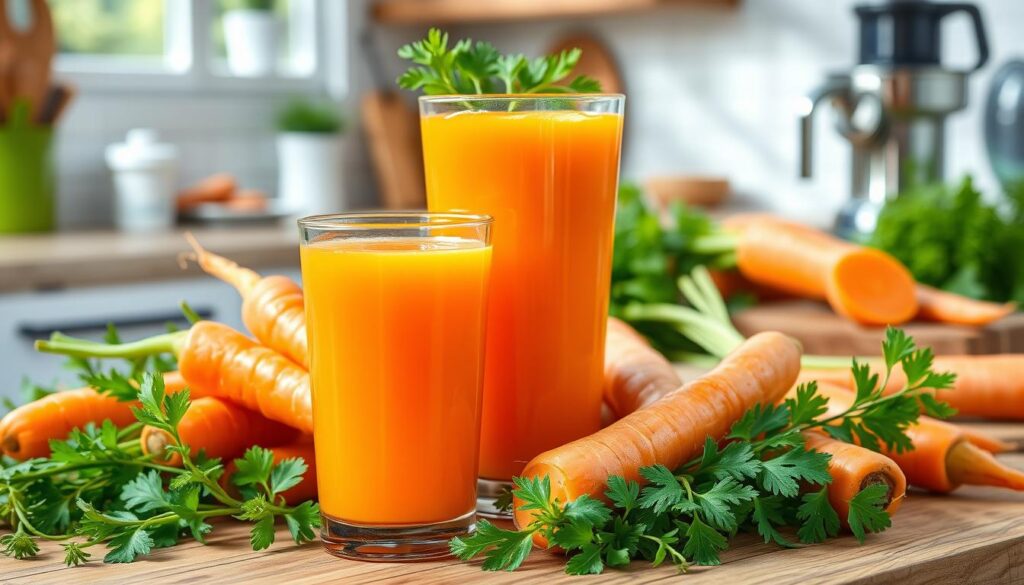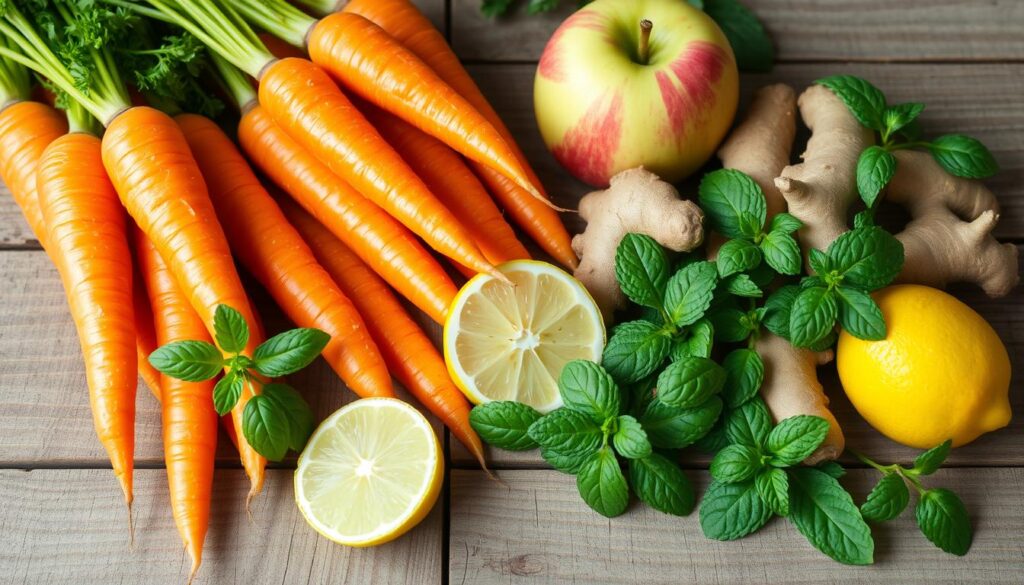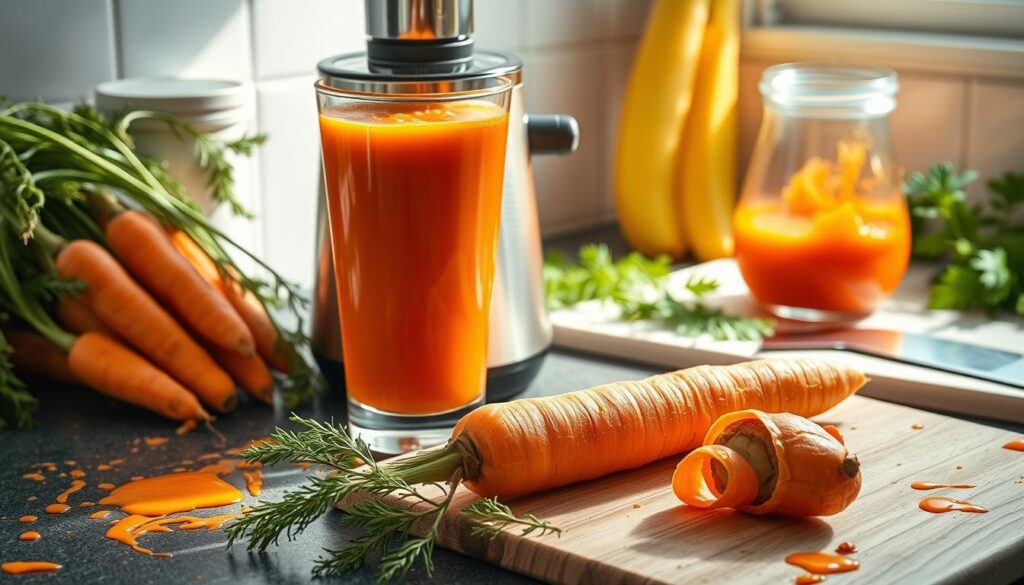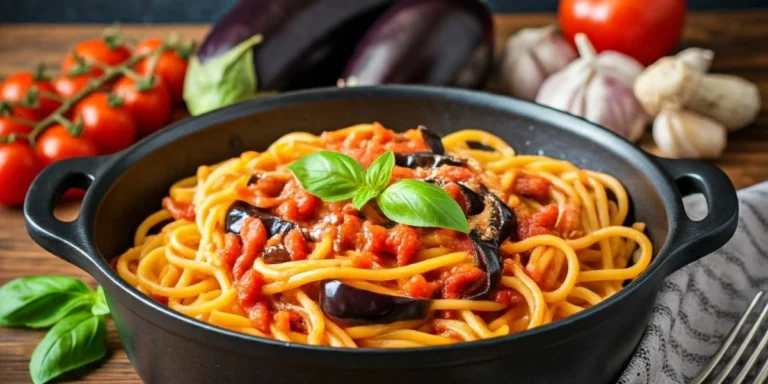Easy Carrot Juice Recipe for Healthy Sipping
Carrot Juice Recipe ,What makes a perfect healthy juice recipe? Is it the mix of ingredients, how easy it is to make, or the health perks it offers? Carrot juice is a standout because of its vitamins and antioxidants. It’s a tasty drink that can give you energy and help your health.
Table of Contents

Carrot juice tastes sweet and refreshing. It’s a great way to add healthy habits to your day. But what’s so special about carrot juice, and how can you get the most health benefits from it? Let’s explore the world of healthy juices and see why carrot juice is so good for you.
Key Takeaways
- Carrot juice is a nutritious beverage rich in vitamins and antioxidants
- It provides numerous health benefits, including boosting energy and supporting overall well-being
- Carrot juice is a great addition to healthy juice recipes due to its sweet and refreshing taste
- It can be easily incorporated into your daily routine for a healthy habit
- Carrot juice benefits include supporting healthy digestion and immune function
- It can be made at home with a simple and easy recipe
Benefits of Fresh Carrot Juice
Fresh carrot juice is a nutritious drink that offers many health benefits. Juicing for health is getting more popular, and carrot juice is a top choice. It’s full of vitamins A, C, and K, and minerals like potassium and iron.
Carrot juice helps reduce inflammation, boosts the immune system, and aids digestion. To get these benefits, drink it in moderation. Aim for 1-2 cups a day.
Nutritional Profile
A single cup of fresh carrot juice has:
- Vitamins A, C, and K
- Minerals like potassium and iron
- Antioxidants and phytochemicals
Health-Boosting Properties
Carrot juice has many health benefits, including:
- Reducing inflammation
- Supporting immune function
- Promoting healthy digestion
Daily Recommended Intake
To enjoy carrot juice’s benefits, drink it in moderation. The right amount varies by person. But, a good rule is to have 1-2 cups a day as part of your juicing for health routine.
Selecting the Perfect Carrots for Juicing
Creating easy juice recipes starts with the right ingredients. Choosing fresh, organic, and ripe carrots is key. Look for carrots that are firm, straight, and bright orange.
Steer clear of wilted, bruised, or green-topped carrots. They might taste bitter and be less healthy. Choose carrots with a sweet and earthy smell. They will make your juice taste richer.
For the best results, follow these tips:
- Choose carrots that are heavy for their size
- Opt for carrots with a smooth, glossy skin
- Avoid carrots with visible signs of mold or rot
By picking the right carrots, your juices will be tasty and full of nutrients.
Remember, the key to making great juice is to use high-quality ingredients and to experiment with different combinations to find your favorite flavors.
Adding careful carrot selection to your recipes can make your juices better in taste and health. With a bit of practice, you’ll be making delicious, healthy drinks in no time.
Essential Equipment for Making Carrot Juice
To make tasty and healthy carrot juice, you need the right tools. There are many juicer types, like centrifugal, masticating, and cold-press. Each has its own benefits, so picking the right one is key.
Centrifugal juicers are fast and efficient. Masticating juicers are slower but make better juice. Cold-press juicers crush and press to keep more nutrients and flavor. The equipment you choose greatly affects the juice’s quality and taste.
You’ll also need a cutting board, knife, and strainer. These help prepare carrots and make juicing smooth. Blenders or food processors can also work, but they might not make juice as good as a juicer.
Key Considerations for Choosing a Juicer
- Speed and efficiency
- Quality of juice
- Ease of use and cleaning
- Price and value
Think about these points and pick the best juicer and equipment. This way, you can make delicious and healthy carrot juice at home.
| Juicer Type | Speed | Quality of Juice | Price |
|---|---|---|---|
| Centrifugal | Fast | Good | Affordable |
| Masticating | Slow | High | Medium |
| Cold-Press | Slow | High | High |
Basic Carrot Juice Recipe
To make a tasty and healthy homemade carrot juice, you need a few simple things. You’ll need carrots, apples, and ginger. This recipe is one of the easy juice recipes you can make at home with a juicer.
Here’s how to make this basic carrot juice recipe:
- Wash and peel the carrots, then chop them into chunks.
- Feed the carrot chunks into your juicer, along with an apple and a slice of ginger.
- Strain the juice and serve immediately.
This recipe is perfect for beginners who want to try homemade carrot juice. You can also play with different easy juice recipes by adding or swapping ingredients.
With this basic recipe, you can enjoy fresh carrot juice easily with a juicer. It’s great for both new and experienced juicers. This recipe is a fantastic way to start making homemade carrot juice and exploring easy juice recipes.
Preparation and Cleaning Tips
When making juice, cleaning carrots right is key. Start by washing them in cold water to get rid of dirt. This makes sure your juice is safe and good to drink.
To clean carrots, first rinse them under cold water. Then, use a vegetable brush to scrub off dirt. Next, peel the carrots with a vegetable peeler to remove the skin.
Washing and Peeling Guidelines
Peeling carrots keeps dirt and bacteria out of your juice. Some juicers need carrots chopped before juicing. Use a light touch when cutting to avoid pulpy carrots.
Cutting Techniques
Here are tips for cutting carrots for juice:
- Chop the carrots into chunks or slices, depending on the juicer’s requirements
- Use a sharp knife to prevent crushing or tearing the carrots
- Cut the carrots in a way that minimizes waste and maximizes juice extraction
By following these tips, your carrot juice will be fresh and tasty. Always focus on cleaning and handling carrots well for the best juice.
| Step | Description |
|---|---|
| 1. Washing | Rinse carrots under cold running water |
| 2. Peeling | Use a vegetable peeler to remove the skin |
| 3. Cutting | Chop carrots into chunks or slices for juicing |
Flavor-Boosting Ingredients
To make your carrot juice taste better, try adding a squeeze of fresh lemon, lime, or orange juice. These citrus flavors mix well with carrots’ natural sweetness. They make your drink refreshing and lively.
There are other carrot juice ingredients you can try too. Here are a few:
- A pinch of salt to enhance the taste
- A handful of fresh herbs like parsley or cilantro for extra depth
- A few dates or a drizzle of honey for sweetness
Creating a great juice flavor is all about trying different things. With a bit of creativity, you can make your carrot juice a tasty and healthy choice every day.

Adding these carrot juice ingredients to your routine can make your juice even better. It lets you enjoy all the good things about this healthy drink.
Creative Carrot Juice Combinations
Carrot juice is great for mixing with fruits and veggies. This creates unique and tasty flavors. It’s key to pick ingredients that taste good and are good for you.
Fruit Additions
Fruits like pineapple, mango, or berries make carrot juice sweet and tangy. They’re full of vitamins, minerals, and antioxidants. Try carrot juice with pineapple and coconut water for a refreshing drink.
Vegetable Mix-ins
Adding veggies like cucumbers, celery, or bell peppers adds a fresh and savory taste. These are low in calories but packed with nutrients. You can also try different spices and herbs to make your juice even better.
Spice Enhancements
Spices like ginger, turmeric, or cayenne pepper add a kick to carrot juice. They’re good for fighting inflammation and boosting your immune system. Start with a little spice and adjust to taste, as they can be strong.
Storage and Shelf Life
Keeping carrot juice fresh is key to its nutritional value and taste. It can stay good in the fridge for up to 24 hours. Make sure to store it in a sealed container and keep it out of sunlight.
To keep carrot juice fresh longer, freeze it in ice cube trays or glass bottles. This way, you save its nutrients and taste. Here are some tips for storing carrot juice:
- Use airtight containers to prevent oxidation and contamination.
- Keep the juice away from direct sunlight and heat sources.
- Label and date the containers for easy identification.
- Store the juice in the refrigerator at a temperature below 40°F (4°C).
By following these tips, you can enjoy your carrot juice while keeping its nutritional value and taste. Always check the juice for any signs of spoilage before drinking it.
Freezing is a good option for longer storage. Frozen carrot juice can last up to 3 months. Just thaw it in the fridge or at room temperature when you’re ready to drink it.
Proper storage and handling are crucial for the quality and safety of your carrot juice. By following these guidelines, you can enjoy the benefits of carrot juice while keeping its nutritional value and flavor.
Troubleshooting Common Issues
When making carrot juice, you might face issues like texture problems or taste adjustments. Understanding the causes and solutions is key. Texture issues, like a pulpy or foamy juice, are common.
To fix texture problems, strain the juice through a fine-mesh sieve or cheesecloth. This removes excess pulp, making the juice smoother. Adding a pinch of salt can also reduce foam and improve texture. For taste issues, like bitterness or sweetness, a squeeze of lemon or honey can balance the flavor.

- Use fresh, high-quality carrots for the best taste and texture.
- Try different ingredient combinations to find the perfect flavor balance.
- Keep the juice in the fridge to prevent spoilage and keep its nutrients.
By following these tips and being aware of common issues, you can enjoy a tasty and healthy carrot juice. Always prioritize food safety and proper handling when making and storing your juice.
| Issue | Solution |
|---|---|
| Texture problems | Strain the juice or add a pinch of salt |
| Taste adjustments | Add a squeeze of lemon or a drizzle of honey |
Best Times to Drink Carrot Juice
Drinking carrot juice is good at any time, but knowing the best juice timing boosts its benefits. Studies show that having it in the morning can increase energy and support your immune system. It’s packed with vitamins and minerals, making it a great morning pick-me-up.
Drinking carrot juice before a workout is also beneficial. It’s full of carbs and electrolytes, which can improve your performance and prevent dehydration. It’s good for anyone, whether you’re a pro athlete or just starting out.
Morning Benefits
- Boosts energy levels
- Supports immune function
- Rich in vitamins and minerals
Pre-workout Options
- Natural source of carbohydrates
- Provides essential electrolytes
- Enhances workout performance
Choosing the right juice timing and understanding the carrot juice benefits can make a big difference. Always pick fresh, quality carrots. Enjoy your juice in moderation as part of a healthy diet.
Potential Side Effects and Precautions
Carrot juice is usually safe, but there are some juice side effects to watch out for. These can include allergic reactions, digestive problems, and issues with certain medicines. Always talk to a doctor before drinking carrot juice, if you have health issues.
Some people might get stomach upset or diarrhea because of carrots’ high fiber. To avoid this, start with a little and slowly add more. Also, if you have diabetes, keep an eye on your blood sugar, as carrot juice can change it.
- Consult with a healthcare professional before consuming carrot juice, if you have health issues.
- Start with small amounts and gradually increase to avoid digestive problems.
- Monitor blood sugar levels, as carrot juice can affect blood sugar control.
Knowing the juice side effects and taking the right carrot juice precautions lets you enjoy its health benefits. This way, you can minimize risks.
Conclusion
Adding carrot juice recipes to your daily routine can change your life for the better. This drink is packed with nutrients and offers many health benefits. It can boost your immunity and help your eyes stay healthy.
Carrot juice is made from fresh, organic carrots. It’s a treasure trove of natural goodness. You can enjoy it on its own or mix it with other fruits and veggies for a tasty treat.
Drinking carrot juice regularly is important. It helps you get the most health benefits. So, make it a part of your diet and enjoy the journey to wellness.
Carrot juice is not just good for you; it’s also delicious. Its vibrant color and rich nutrients can improve your health. Enjoy it and make it a key part of your healthy lifestyle.
FAQ
What are the key benefits of drinking carrot juice?
Carrot juice is packed with vitamins, minerals, and antioxidants. It boosts your immune system, supports healthy vision, and aids in digestion.
How should I select the perfect carrots for juicing?
Choose fresh, organic carrots that are vibrant and firm. Avoid wilted or bruised carrots with green tops, as they’re less nutritious.
What type of juicer is best for making carrot juice?
You can use centrifugal, masticating, or cold-press juicers for carrots. Centrifugal juicers are common and affordable. Masticating and cold-press juicers make higher-quality juice.
Can I use a blender or food processor to make carrot juice?
Yes, blenders or food processors can make carrot juice. But, the juice might not be as smooth and could have more pulp.
How long can I store freshly made carrot juice?
Store carrot juice in the fridge for up to 24 hours. For longer storage, freeze it in ice cube trays or glass bottles.
What are some common issues I might encounter when making carrot juice?
You might face texture or taste problems. For texture issues, strain the juice. For taste, add a pinch of salt or a squeeze of lemon.
When is the best time to drink carrot juice?
Drink carrot juice anytime, but it’s great in the morning or before a workout. It gives a natural energy boost and improves physical performance.
Are there any potential side effects or precautions to be aware of when drinking carrot juice?
Carrot juice is usually safe, but be aware of potential side effects. These include allergic reactions, digestive issues, and interactions with medications. Always consult a healthcare professional, even if you have no health issues.







